Seconded By: Vladimir Karamazov,
“The Other Battlefields” explores the profound imprint of war on Ukrainian youth, offering a glimpse into what it means to grow up and live in a country at war, more than three years after the Russian invasion.
The years of youth are normally synonymous with widening horizons, the weaving of friendships, and the promise of adventure. But for many young Ukrainians, those expectations have been shattered, replaced by fear, loss, depression, and exile.
This visual narrative unveils fractured lives and dimmed dreams, yet also a fierce resilience that pushes back against the surrounding darkness. Each image is a fragment, part of individual stories I have been following over the long term. These stories themselves are part of a broader mosaic, reflecting the hopes and realities of a wounded nation.
It was in June 2022, in Odesa, that I fully realized the importance of documenting this sacrificed generation. Young graduates, deprived of their commencement ceremony for obvious security reasons, transformed their frustration into a spontaneous art performance, later sharing it on social media to show the world what they had lost, and what they were enduring. That poignant moment revealed the urgency of bearing witness and preserving their stories.
The visible scars are only part of the narrative. Beneath the surface lie other wounds, invisible yet profound, that testify to a war also fought within the soul. These battles, whether close to or far from the frontlines, are those of freedom, dignity, reconstruction, and hope. Together, they draw the many contours of a conflict that is irreversibly shaping Ukrainian youth and its future.
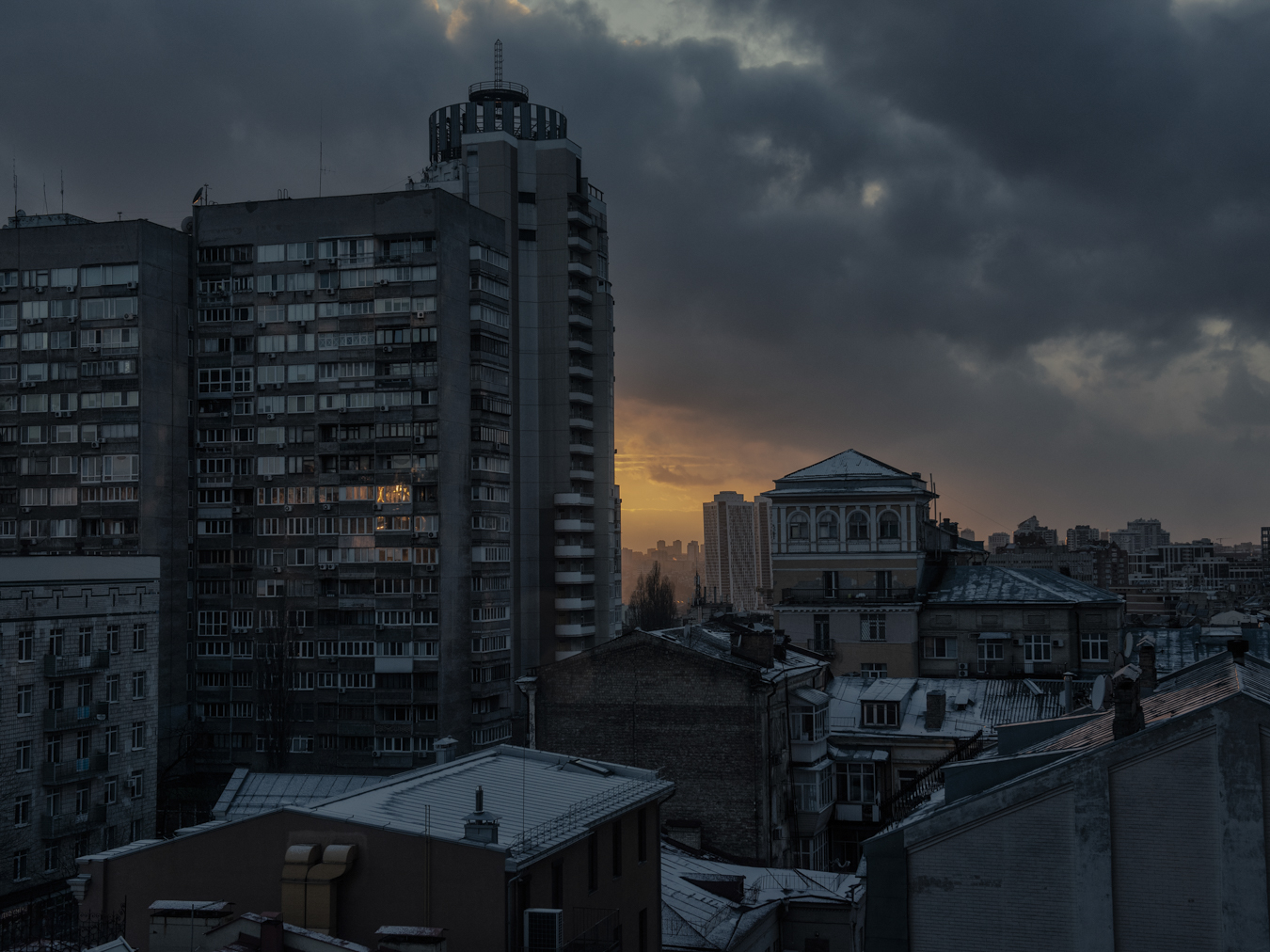
Kyiv I Ukraine I 12.03.2023.
Since the first Russian strikes on Ukraine’s energy infrastructure, blackouts have become part of daily life in Kyiv. Power cuts, heating failures, stalled elevators, and darkness are now routine.
In this stormy cityscape, a single-lit window stands out. It marks a brief, fragile return of electricity, a moment of normalcy in a life shaped by uncertainty. For many young Ukrainians, growing up in war means adapting to these constant disruptions. A warm room, a working light: small but vital anchors in a world that no longer feels stable.

Kyiv I Ukraine I 02.04.2023
Emilia Devoe, 18, rides the subway on her way to a concert where her boyfriend Denys will perform. The two met at a birthday party in Kyiv, their first serious relationship, full of excitement and possibility. Then, the war began, and everything changed. As Russian forces advanced on Kyiv, Emilia fled with her family to the Netherlands, while Denys, as an adult male, was prohibited from leaving Ukraine. The separation proved difficult. After four months abroad, Emilia decided to return. Like many of her generation, Emilia feels that the war has accelerated her transition into adulthood faster than she would have liked.
“My opinion about the war is more a hope than anything else,” she says. “I hope it ends soon. I’m just sick of it. Part of me still wants things to go back to normal, but I know they won’t. Too much has changed.”
To cope, she’s learned to protect herself emotionally. “You can’t always be on high alert or hysterical. You’ll lose your mind. You shut down a bit. You slow down, stay quiet, and that’s how you deal with it. Everyone’s used to the war now. We all had to adapt.”
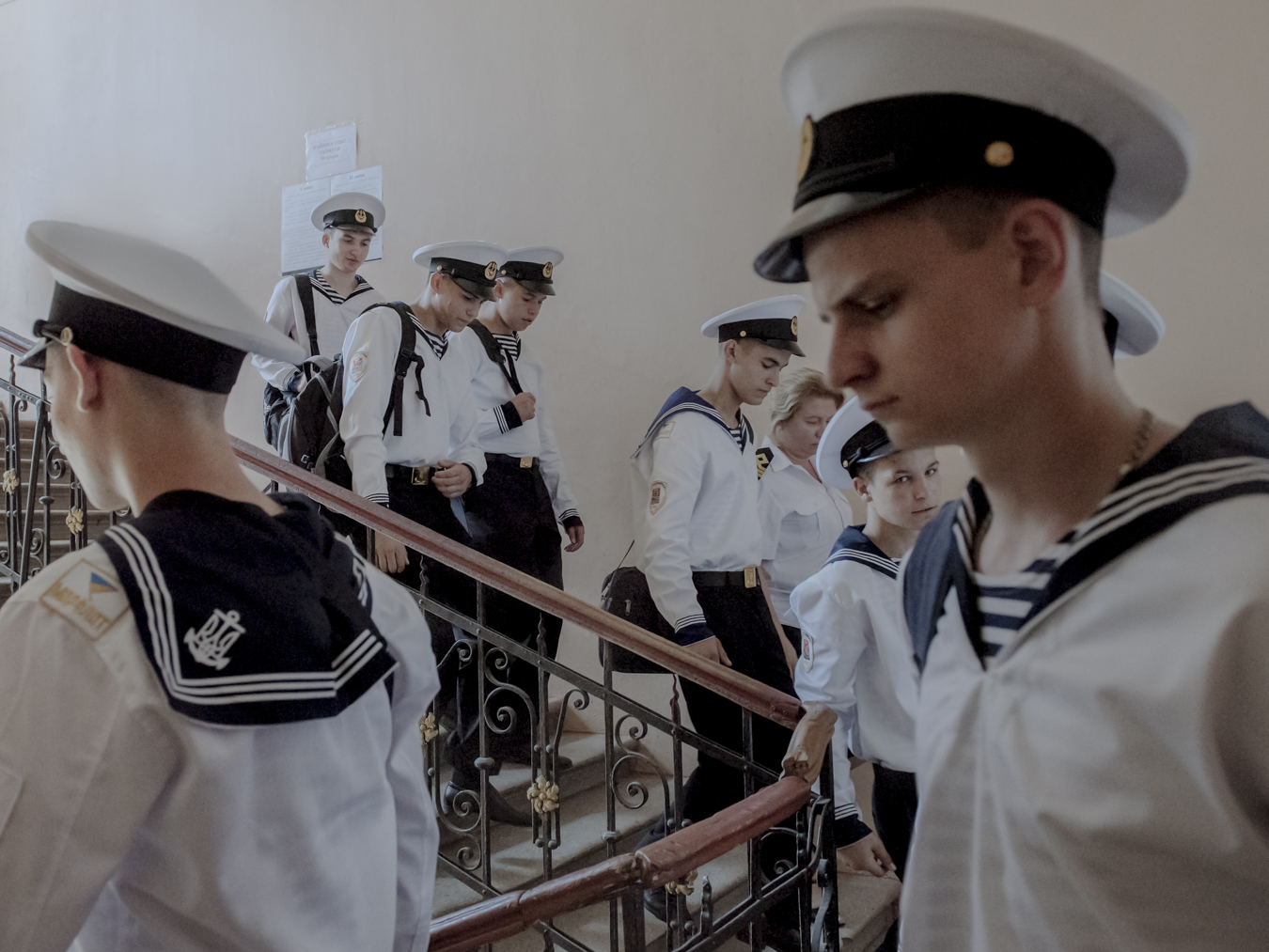
Odesa I Ukraine I 21.08.2023
Cadets from the Odesa Sea Academy descend the staircase between classes, dressed in naval uniforms that once symbolized a clear path toward global maritime careers.
Before the full-scale invasion, Odesa’s port was a thriving gateway to the world, a training ground for future captains, engineers, and navigators. But with shipping routes blocked by mines, civilian vessels grounded, and the Black Sea under military threat, the maritime future these students imagined now hangs in uncertainty.
Once a route to opportunity, the sea is now a contested and restricted zone. For these students, the war has interrupted not only their education but also the prospects of entering an industry that has all but stalled, reflecting a wider disruption in the transition to adulthood for Ukraine’s youth.
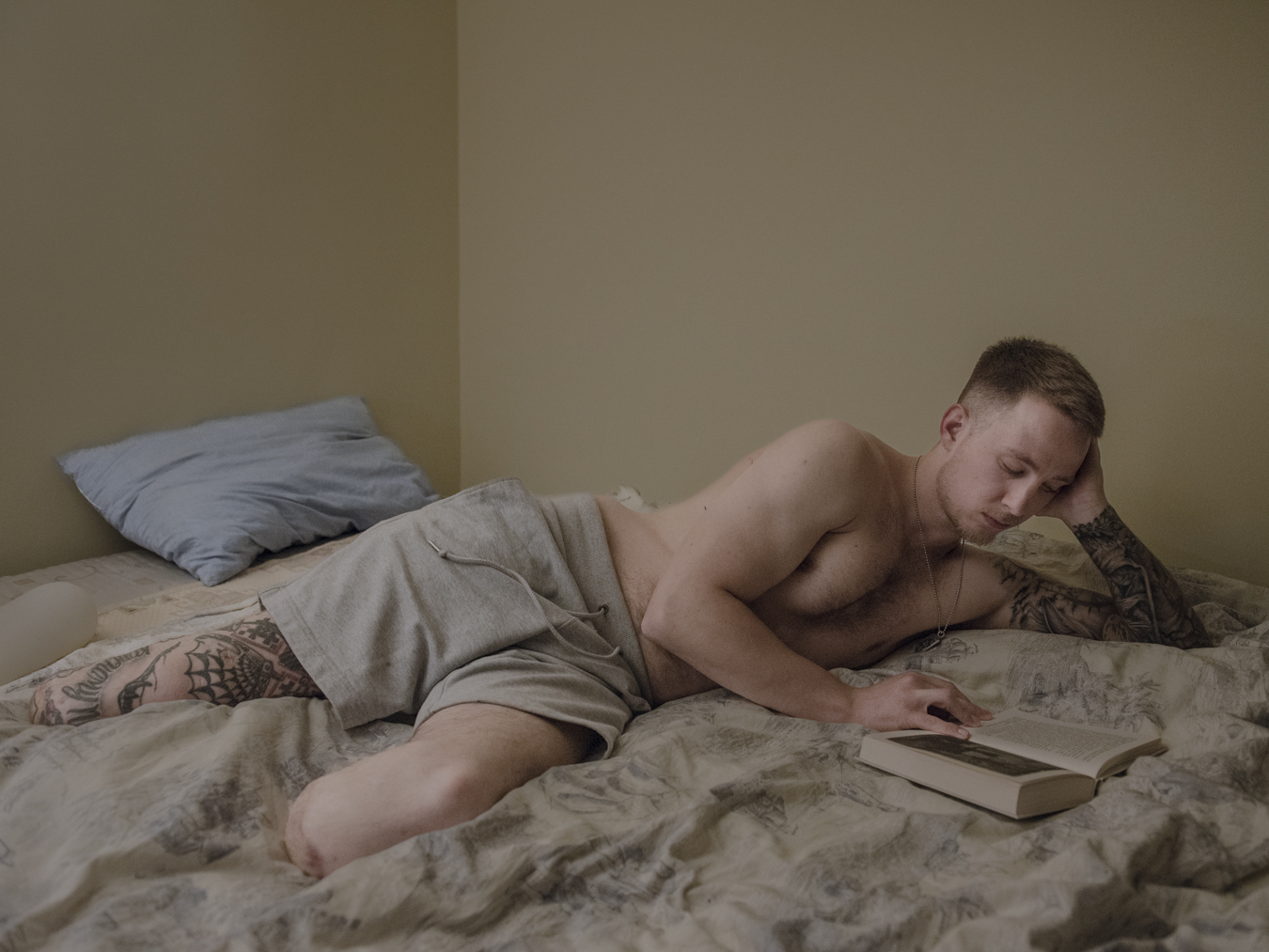
Kyiv I Ukraine I 26.06.2022.
As a teenager, Oleksandr Budko, known as Teren, was inspired by stories of Ukrainian fighters. He dreamed of serving his country. On the first day of Russia’s full-scale invasion, he enlisted. After defending Kyiv, he was deployed to Kharkiv. But the dream ended abruptly when a shell blast took both of his lower legs.
“There were ambiguous emotions,” he says. “Pain, panic, fear, but also disbelief. My brain refused to accept what had happened.” Now, after months in hospitals and rehab, he is learning to inhabit a new version of himself and the world around him. The body he once trusted became foreign; the bedroom where he now rests has become a space of reflection and reinvention. “I stopped seeing this as a disability, and started seeing it as an opportunity.” Through social media, Teren shares his story, promotes mental resilience, and calls for reform in the care of wounded soldiers. His new battlefield is one of identity, presence, and purpose, where inner strength meets a transformed environment.
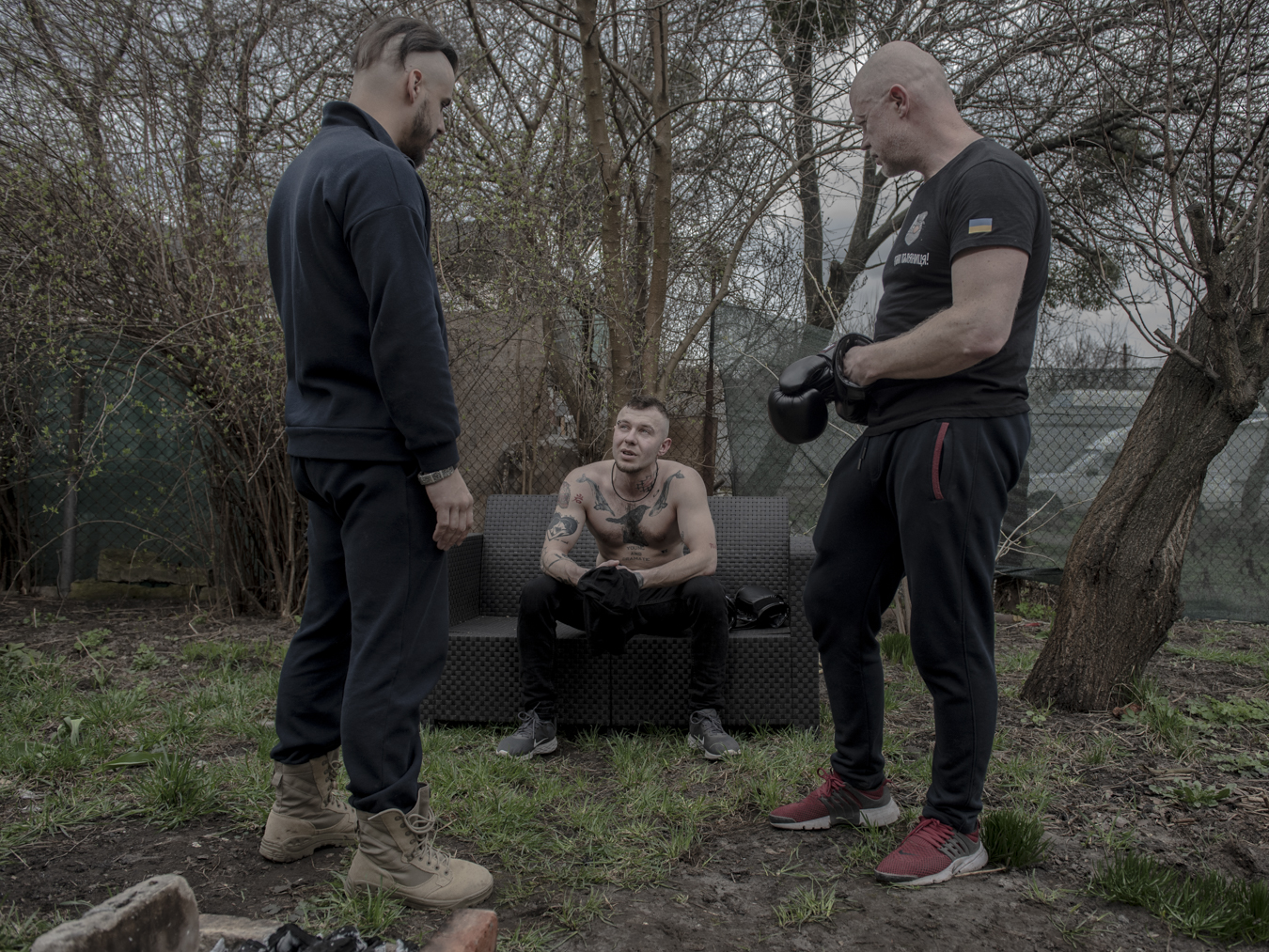
Kyiv I Ukraine I 01.04.2023.
After a boxing session in Ihor’s backyard, Mykhailo Panchyshyn (25), Ioann Zenkov (29), and Ihor Ermetov (50) gather to rest and talk. The three men knew each other before the full-scale invasion, but their bond was forged on the battlefield. Now injured and reformed, they meet regularly. Ihor, a seasoned boxing master, teaches Mykhailo to fight with his fists; in return, Mykhailo coaches him in singing. Ihor and Ioann have become anchors in Mykhailo’s life; trusted friends and gentle mentors.
“The war stole my youth,” says Mykhailo (in the middle), “but it also gave me clarity. I’ve learned what matters to me: my values and my priorities. I’ve found myself. I feel more at peace in my own skin. Life has meaning now.”This backyard, once an ordinary domestic space, has become a quiet arena for rebuilding, where camaraderie, physical recovery, and creative exchange offer a way for this young generation to navigate the scars of war and reclaim agency within their environment.
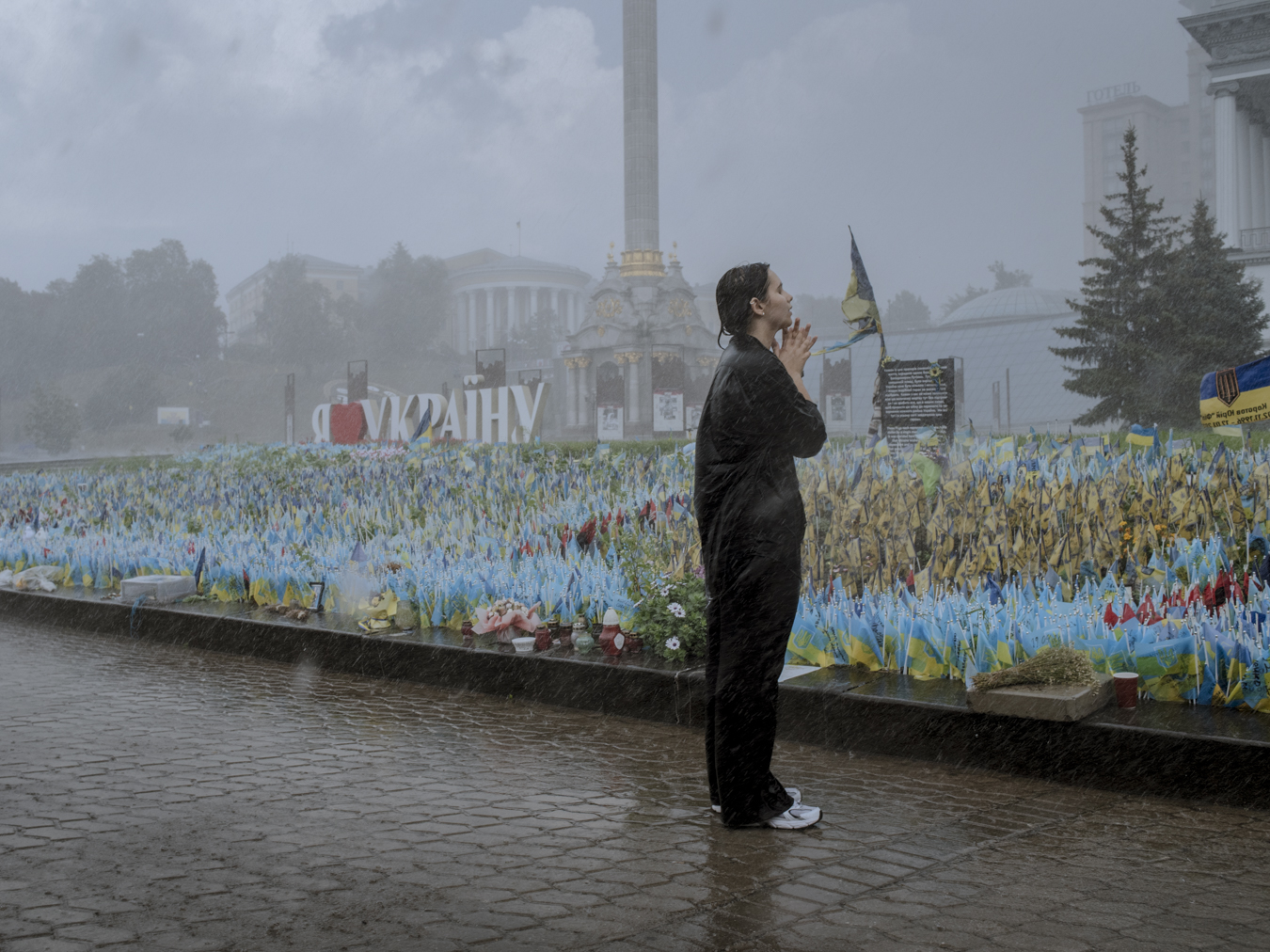
Kyiv I Ukraine I 21.08.2023.
Anastasia Ivashchenko returned to Kyiv from Poland, where she had sought refuge at the start of the war, to visit her father and younger brother. That day, undeterred by the heavy rain, she purchased a flag in memory of her older brother, who was killed near Bakhmut on January 23, 2023. Quietly, she placed it among thousands of others at the makeshift memorial on Maidan Square, each one a fragile but powerful tribute to those who lost their lives in Russia’s war against Ukraine. In this landscape of remembrance, her gesture becomes a thread between grief and resilience, absence and presence.
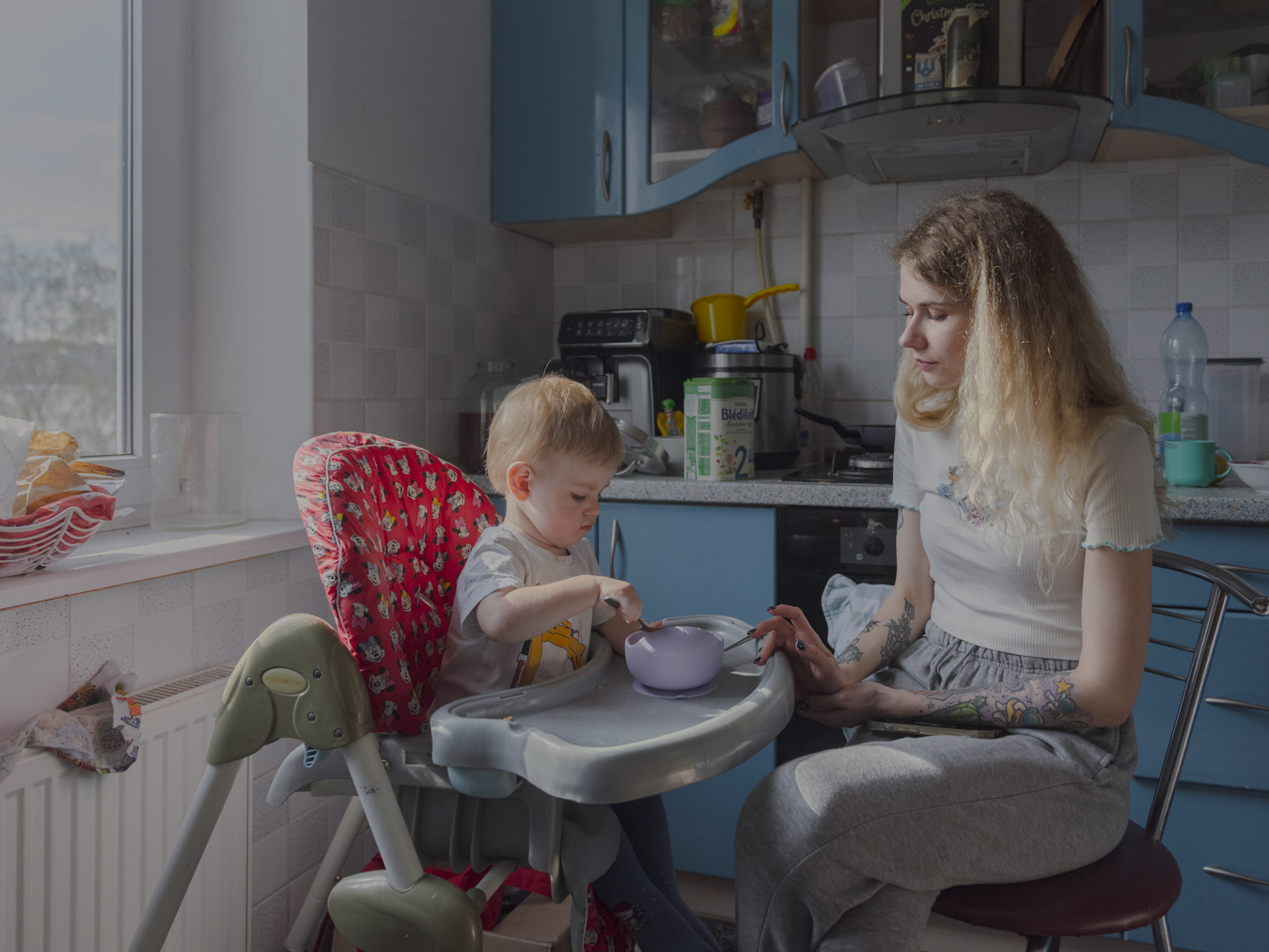
Chernihiv I Ukraine I 11.04.2023.
Maryna Bodnar, 23, feeds her one-year-old son, Gennady, in their modest kitchen. Once a thrill-seeking free spirit from Mariupol, Maryna’s life took a sudden turn when she fell in love with Vitalik, a soldier, in 2019. Within two years, they welcomed two children, Matviy and Gennady, without needing a marriage certificate. “We were already everything we needed to be — parents, partners. The paper didn’t matter,” she said.
But on March 12, 2022, Vitalik was killed defending Mariupol. Since then, Maryna has been raising her sons alone, far from her destroyed hometown. In this quiet moment, beneath the soft morning light in Chernihiv, she holds onto routine and care.
For a generation marked by rupture, rebuilding begins with small gestures: feeding a child, holding on to memory, creating tenderness where life tried to take it away.
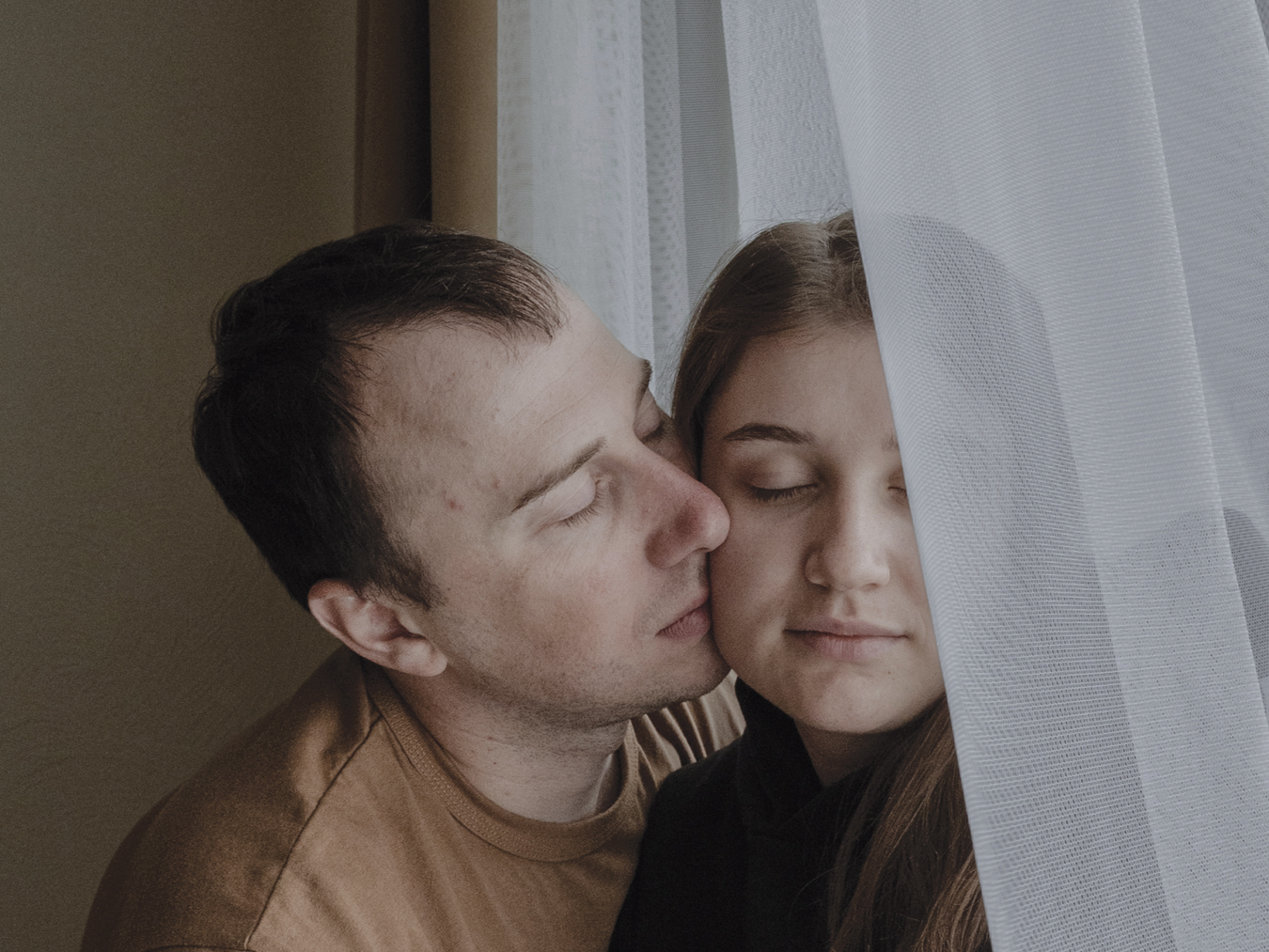
Truskavets I Ukraine I 19.09.2023
After more than a year apart, Kateryna Plechystova and her husband Oleh reunite at a rehabilitation center. Oleh, a former Azov Battalion soldier, had been held in captivity while Kateryna, originally from Mariupol, endured months of anxiety and depression in Kyiv. Their embrace speaks to a reunion marked not by simple joy but by the weight of trauma, each struggling to reach the other, both still caught in the invisible prisons left by war.
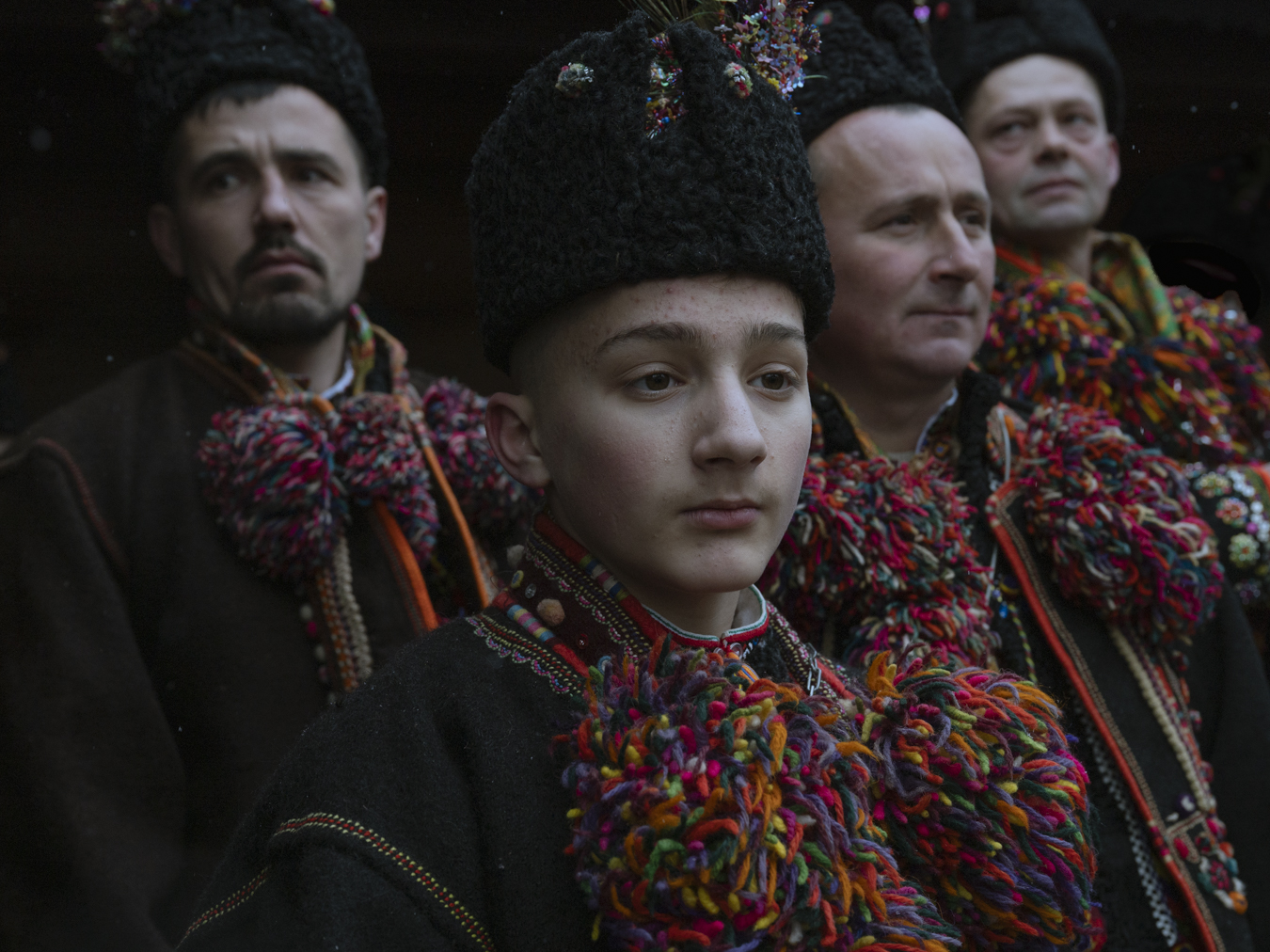
Kryvorivnia, Ukraine I 25.12.2025.
On Christmas Day, Hutsul musicians and singers gather around the wooden church of Kryvorivnia, keeping alive a sacred tradition. Music here is not mere performance; it is prayer and identity. The polyphonic chants of Koliadky, blending Orthodox liturgy with ancient pagan roots, echo through the snowy Carpathians like ancestral memory. Their richly symbolic costumes, embroidered wool, fur trims, and vibrant pom-poms are worn like protection. Among the older voices, the presence of the youth is vital: learning, singing, and embodying a legacy. In a time of war and rupture, these songs offer them more than heritage; they offer grounding, direction, and a sense of belonging rooted in something deeper than conflict.
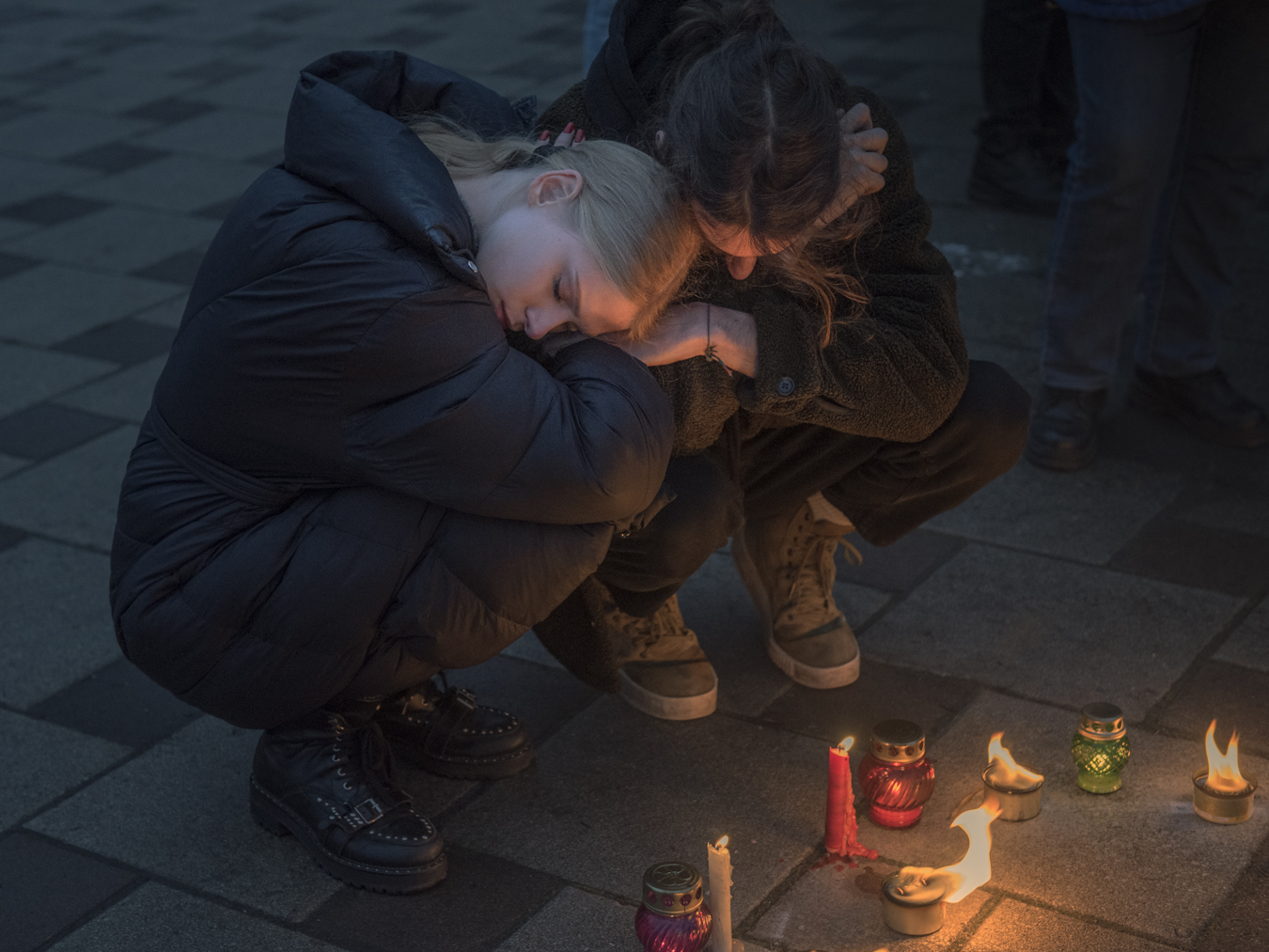
Bucha I Ukraine I 31.03.2022.
On March 31, 2023, Bucha commemorated the first anniversary of its liberation, a day marked by grief.
During the “Candle of Memory and Peace” ceremony at Taras Shevchenko Square, participants gathered to pay homage to the soldiers of the Bucha community who sacrificed their lives in battle. The participants lit candles arranged in the shape of Ukraine, a symbolic gesture of remembrance and unity. Among them were Michaela and Oleksander. They came specifically from Kyiv to honor the fallen.
Michaela, who had fled to Poland, is now grappling with the mental health consequences of displacement while studying in a foreign country. Her journey reflects the struggles of many refugees facing grief and the challenges of adapting to a new environment.
Oleksander, unable to leave the country due to military obligations, lives under constant stress and the fear of being called to service. The weight of uncertainty about the future and the possibility of being mobilized cast a shadow on his daily life. The hope of never receiving that call is a sentiment shared by many young men in similar situations.